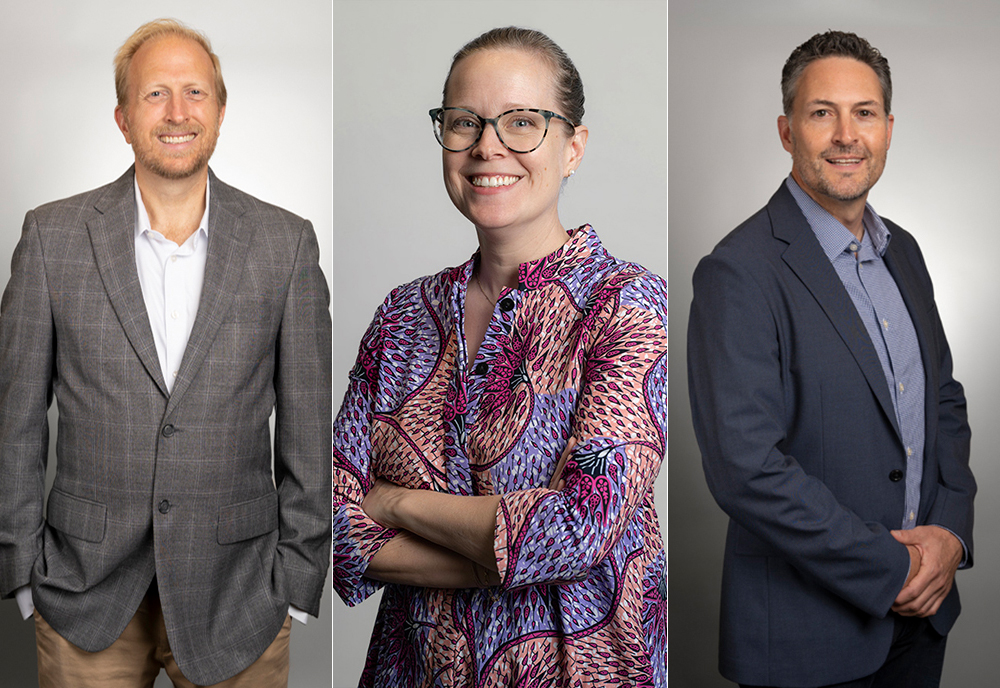At first glance, the work being championed by Heather O’Leary, Will Schanbacher and Christian Wells may seem unrelated. O’Leary, an assistant professor in the Department of Anthropology, is interested in water politics; Schanbacher, an associate professor in the Department of Religious Studies, cares deeply about food sovereignty; and Wells, a professor of anthropology, is improving human and environmental health outcomes of redevelopment efforts in underserved communities.
Beyond the fact that the three are faculty in the College of Arts and Sciences, they have something else in common: a belief in the transformative power of collaboration.
“Faculty and students at USF have such incredible opportunities to bridge the ‘town and gown’ divide by sharing their time, expertise and resources with communities to build capacity for positive change,” said Wells.
By focusing on collaborative, community research, the trio are making an impact and transforming the way others think about everything from coastal change and water sources to food security.
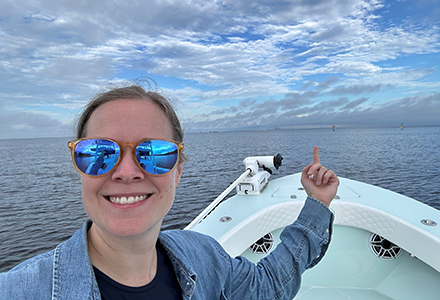
Heather O’Leary examining the Pasco County shoreline for crucial inroads. (Photo courtesy of Heather O’Leary, PhD)
Heather O’Leary, PhD
Heather O’Leary, an assistant professor on the St. Petersburg campus, is reinventing the way we analyze coastal change. Along with her transdisciplinary sonification team, O’Leary has transformed social, economic and environmental data into music. This university-wide collaboration has broadened the dialogue around coastal change through creativity and innovation.
“I’m understanding water from a community perspective by partnering with women’s organizations and informal, illegal settlement communities in Delhi, India, to working with Tampa Bay’s subsistence fishing communities,” O’Leary said. “I prioritize mutual understanding and active engagement in data collection by transforming our findings into something you can participate in and interact with in a very real way.”
O’Leary believes that listening to the impacts of watery disasters on everyday people is an essential aspect of data collection. Her focus is on listening, first and foremost.
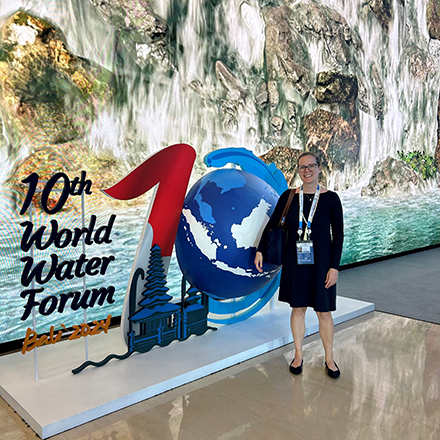
Heather O’Leary representing USF in Bali at the 10th World Water Forum, the largest international gathering in the water sector. (Photo courtesy of Heather O’Leary, PhD)
“In order for communities to be resilient, we need not only formal official data, but we also need to listen to community members about how their intersectional identities affect the way decision makers imagine those processes and impacts of watery disasters,” O’Leary said. “So, through actually listening to lots of our Floridian neighbors, we're able to plan better policies and build more economic and environmental resilience so that the next time we have a water threat, we're ready, our communities are ready and our families are ready.”
Though her work focuses heavily on Florida’s coasts, O’Leary is always thinking of the way water — and the issues surrounding it — connect all people.
“All of us as humans grow up with a heavy reliance on water,” O’Leary said. “I can track my life through moving through the Great Lakes, to the Ganges in India, to the mighty Mississippi and now to the Gulf. And there wasn't one place that I lived where questions — such as who owns our water, who is keeping it clean, who is receiving information about the risks — have been irrelevant.”
For O’Leary, these questions are what fuel her research.
“I think, as an anthropologist, I'm really interested in the gaps between the way plans ought to go and the way they actually happen in our real, chaotic world,” said O’Leary, who is also the Director of the EcoFem Lab and Crescendo Project.
Will Schanbacher, PhD
Will Schanbacher believes food is a human right.
He spends much of his time working with the WellFed Community and the Healthy 22nd Street Community Garden, two nonprofits dedicated to building healthier communities through sustainable food systems. His interest in local food sovereignty research began when he moved to East Tampa and started building relationships within the community.
“I wanted to see if my research in global food sovereignty could be applied to local, urban settings,” Schanbacher, co-founder and director of the USF Food Sovereignty Initiative, said.
Both programs have had a transformative impact on the lives of community members.
“The Healthy 22nd Street project has helped people start growing their own food, which also introduced them to new healthy recipes,” Schanbacher said. “People mentioned saving money on their weekly groceries, which has become a part of the non-profit's mission statement. Some gardeners mentioned they were able to reduce or come off medications because of physical health improvements.”
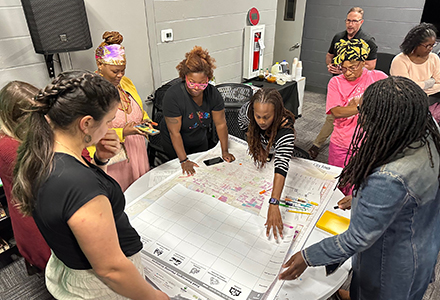
GIS Asset mapping workshop at the Dream Center with residents in East Tampa. (Photo courtesy of Will Schanbacher, PhD)
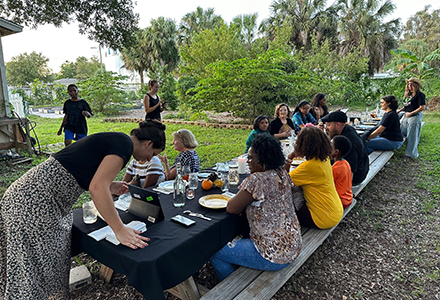
Community dinner catered by WellFed Community and the USF Food Sovereignty Initiative. Cornerstone Ministries community garden in background. (Photo courtesy of Will Schanbacher, PhD)
Working with WellFed Community on a USDA Urban Agriculture and Innovative Production
grant, the FSI helped create a food sovereignty toolkit that provides researchers
with a framework for developing their own food sovereignty initiatives. Drawing from
the core pillars of food sovereignty – the right to food, prioritizing local production
and local producers, cultural food access, ecologically sound agricultural practices
and the flourishing of local communities rather that corporate interests – this toolkit
provides practical activities for hands-on community engagement. Examples include
integrating research design and community building through community meals, photovoice
research that allows community members to tell their own food stories through pictures
and an evaluation matrix for organizations building their food sovereignty projects.
The process of developing the toolkit will be published this summer in the peer reviewed
Journal of Agriculture, Food Systems and Community Development.”
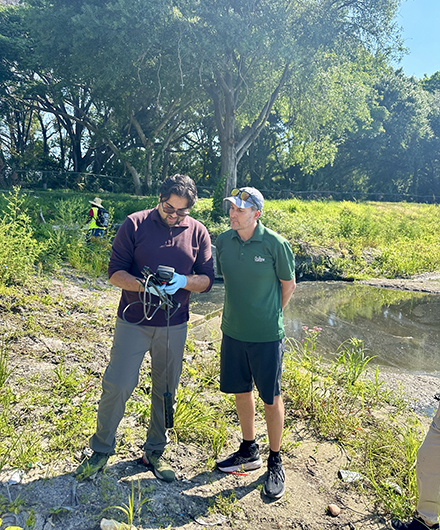
Christian Wells examining the levels at Aaron’s Pond. (Photo courtesy of Christian Wells, PhD)
Christian Wells, PhD
Christian Wells, director of the Center for Brownfields Research & Redevelopment, is working collaboratively with the residents of Tallevast, a historically African American neighborhood in Manatee County that was contaminated over several decades by waste water from a manufacturing plant. While state officials received reports of pollution in 2000, it was not until 2004 that residents of the area were informed.
“We are working collaboratively to identify and clean up harmful contamination in the soil and groundwater so they can live healthier lives,” Wells said. “We are also creating a shared vision and strategic plan for community redevelopment that features health and wellness as core attributes.”
Wells feels that as a university, we have a responsibility to the communities around us.
“I partner with communities like Tallevast because you can’t have a strong university
without a strong community, and you can’t have a strong community without a strong
university,” he said. “Our fates are tied together.”
Even more than university involvement, Wells feels that community input is essential.
“I became heavily involved in community-based research when I served as founding director
of USF’s Office of Sustainability, where I learned that those closer to the problem
are closer to the solution,” Wells said. “Communities know what the challenges are
and how they want them addressed. Working closely with communities and putting them
in the driver’s seat when it comes to making decisions about their future is absolutely
essential for sustainable and equitable development.”
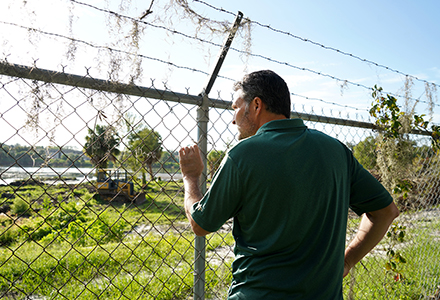
Christian Wells at Aaron’s Pond. (Photo courtesy of Christian Wells, PhD)
Wells believes that this work will impact not only this community’s present, but its
future as well.
“With the support of the National Science Foundation, we have conducted oral histories
with many Tallevast residents to understand the long-term impacts of segregation on
environmental health,” he explained. “And with resources from the Environmental Protection
Agency, we have laid the groundwork for community revitalization by conducting assessments
and cleanup of the local soil and groundwater. For this research, instead of focusing
on the problems, we identified the hopes that residents share about their future.
This way, our research is not about problems, but about helping people achieve their
dreams. This is what I call ‘dreamwork,’ which centers transformation, rather than
transaction, in research relationships.”
Learn more about Schanbacher’s, O’Leary’s and Wells’ research, as well as the Department of Religious Studies and the Department of Anthropology. If you’re interested in supporting their research, please contact Kelly Addington, senior director of development at (813) 974-5764.
